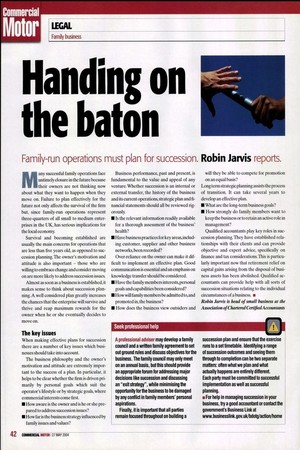Handing on the baton
Page 44

If you've noticed an error in this article please click here to report it so we can fix it.
Family-run operations must plan for succession. Robin Jarvis reports.
Many successful family operations face untimely closure in the future because their owners are not thinking now about what they want to happen when they move on. Failure to plan effectively for the future not only affects the survival of the firm but, since family-run operations represent three-quarters of all small to medium enterprises in the UK, has serious implications for the local economy. Survival and becoming established are usually the main concerns for operations that are less than five years old, as opposed to succession planning. The owner's motivation and attitude is also important — those who are willing to embrace change and consider moving on are more likely to address succession issues
Almost as soon as a business is established, it makes sense to think about succession planning. A well considered plan greatly increases the chances that the enterprise will survive and thrive and reap maximum rewards for the owner when he or she eventually decides to move on. The key issues
When making effective plans for succession there are a number of key issues which businesses should take into account.
The business philosophy and the owner's motivation and attitude are extremely important to the success of a plan. In particular, it helps to be clear whether the firm is driven primarily by personal goals which suit the operator's lifestyle or by strategic goals, where commercial interests come first.
• How aware is the owner and is he or she prepared to address succession issues?
• How far is the business strategy influenced by family issues and values?
Business performance, past and present, is fundamental to the value and appeal of any venture. Whether succession is an internal or external transfer, the history of the business and its current operations, strategic plan and financial statements should all be reviewed rigorously.
• Is the relevant information readily available for a thorough assessment of the business' health?
• Have business practices for key areas, including customer, supplier and other business networks, been recorded?
Over-reliance on the owner can make it difficult to implement an effective plan. Good communication is essential and an emphasis on knowledge transfer should be considered.
• Have the family members interests, personal goals and capabilities been considered?
• How will family members be admitted to, and promoted in, the business? • How does the business view outsiders and
will they be able to compete for promotion on an equal basis?
Long term strategic planning assists the process of transition. It can take several years to develop an effective plan.
• What are the long-term business goals?
• How strongly do family members want to keep the business or to retain an active role in management? Qualified accountants play key roles in succession planning. They have established relationships with their clients and can provide objective and expert advice, specifically on finance and tax considerations. This is particularly important now that retirement relief on capital gains arising from the disposal of business assets has been abolished. Qualified accountants can provide help with all sorts of succession situations relating to the individual circumstances of a business. s Robin Jarvis is head of small business at the Association of Chartered Cerafied Accotattants






























































































































































































